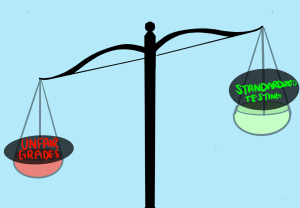[Opinion] Standardized testing is unnecessary
Students throughout the United States believe standardized testing is unnecessary and does not properly administer a student’s knowledge.
April 21, 2022
With testing season quickly approaching in schools across the nation, many students are beginning to prepare for their standardized tests. However, the negative effects of these exams seem to outweigh the benefits as the tests can cause problems for both students and teachers academically and mentally.
Many students do not look forward to the designated testing months of April and May. They begin to stress more about passing the tests and focus less on work they have for their other classes. Managing standardized assessments and the course load for their daily classes can be mentally draining and can make it challenging for students to stay on track.
This stress may also result in them falling behind on daily school assignments. With the added pressure of the standardized exams, it can be harder for assignments to be completed on time or turned in at all. Many students who are under great amounts of stress may not test as easily as others, leading to inaccurate results. Having their focus split between standardized tests, daily requirements of their classes and extracurricular activities can be detrimental to a student.
Additionally, the results of these tests do not show the accurate academic level of students. Although tests such as the FSA give marks based on a scale of one through five, the only purpose of these numbers is for the state to see how students have advanced with their outdated standards. Standardized tests fail to provide parents with timely information to help their child at home, and are not customizable to each student that takes the exam. When seeing their scores after testing, students’ self-esteem and confidence can be diminished.
Compared to regular tests taken in classes, standardized tests contain material from the entire course, and cause students to get overwhelmed with reviewing concepts educated to them throughout the year. Although standardized tests are supposed to depict academic levels of students, they disrupt teaching plans and lessons don’t get taught completely before the end of the school year.
For example, in preparation for the Geometry EOC, math teachers at Marjory Stoneman Douglas High School provided students with extra review work of lessons from the entire school year. However, some of the topics included in the work have not been taught yet. In addition to this review work, instructors are still teaching their regular curriculum which includes classwork and homework assignments to be completed by students. Since these tests go on for multiple days, they can disrupt previous plans. Oftentimes, by the time e testing season is over, most teachers have little to no time to complete their scheduled lesson plans for the year.
The Florida Comprehensive Assessment Test (FCAT) was administered throughout the state of Florida from 1998 to 2014. As a part of Florida’s plan, the FCAT was created to increase the achievement of students by implementing higher standards. This test would be replaced by the Florida Standards Assessment (FSA) in the 2014-2015 school year and will end in the 2021-2022 school year. Governor Ron DeSantis recently signed a bill to replace the FSA with a new assessment, titled the Florida Assessment of Student Thinking (FAST) for the 2022-2023 school year.
This new exam will be taken three times a year: fall, winter and spring, to determine the growth of students enrolled in K-12 schools in Florida throughout the school year. FAST is regarded as a progress monitoring check-in assessment rather than a standardized test.
The goal of these new assessments include eliminating other standardized exams and better meeting the needs of both students and teachers. Instead of wasting numerous school days to administer the test, it will only take a few hours across three days a year. Growth is established based on the Florida B.E.S.T Standards. Introduced in 2020, these new standards increased the quality of the curriculum being taught, along with making subjects less confusing for students, teachers, and parents.
Overall, standardized tests are not an accurate indicator of where students are academically. The cumulative of assignments distributed by teachers based on the given curriculum should give schools a more precise understanding of how their students are advancing throughout different courses. Standardized testing also pushes back the possibility of lessons being taught to students after the tests are done for the day. These tests only cause more problems for students and staff, and eliminating them entirely would be much more beneficial.










